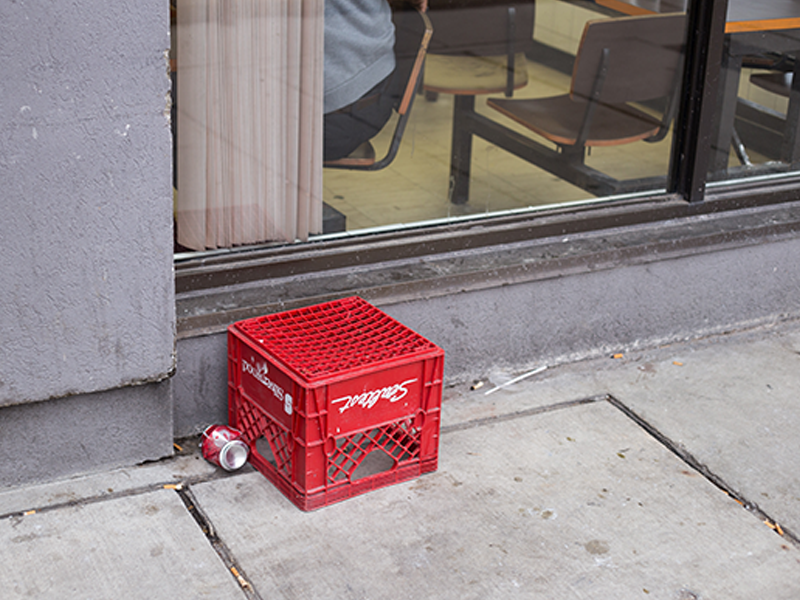
Article reposted from the SSHRC web site
Stephen Gaetz is a professor in the Faculty of Education at York University. He is the president of the Canadian Observatory on Homelessness, the largest national research institute devoted to homelessness in Canada, and the Homeless Hub, a web-based research library and information centre for mobilizing knowledge on homelessness. A member of the Order of Canada, Gaetz has spent decades bringing together researchers, grassroots organizations and policy makers nationally and internationally to contribute to the knowledge base around homelessness prevention. We spoke to Gaetz about the state of homelessness in Canada, his SSHRC-funded research projects, and the role of prevention in finding a solution to homelessness in Canada.

Photo credit: Shane Fester
What is the homelessness situation in Canada?
GAETZ: It’s getting worse. The latest Government of Canada data from 2022 shows a 20 percent increase in homelessness across the country. People are living on streets, in parks, in shelters, in tents and on couches throughout this country. Indigenous Peoples make up about a third of all people who are homeless in Canada. Black and 2SLGBTQIA+ youth are overrepresented as well in homeless shelters. We need to look at our policies around homelessness and prevention and ask ourselves: Are the policies tailored to reflect these vulnerable populations?
Why have we seen such a rise in homelessness across the country?
GAETZ: We created the problem. In the 1980’s the federal government was paying to build up to 25,000 units of social housing and co-ops every year. They stopped doing that, in hopes the private sector would step in and fill the void, but that didn’t happen. We’ve lost 30 years of investment and that’s a lot of housing that didn’t get built. Add to that, the private sector investment in rental housing has tanked as construction companies have decided to focus on building big homes and luxury condominiums. Canada is now in a critical crisis around, not just affordable, but deeply affordable housing. Rents are at an all-time high. At the same time, the population of Canada has grown by 30 percent, to 40 million [as of October 1, 2023, representing the highest population growth rate since 1957], we have less stable employment with fewer benefits, we’ve seen massive job losses through the pandemic, and are left now with more low-paying precarious jobs. All of those things have led to this emergence of ‘modern mass homelessness’.
What makes your work with the Canadian Observatory on Homelessness and the Homeless Hub stand out in Canada and internationally?
GAETZ: Our mission with the Canadian Observatory on Homelessness and the Homeless Hub is prevention. We’ve developed A New Direction: A Framework for Homelessness Prevention to start a nationwide conversation around prevention. By developing a strong knowledge base, we can help inform communities and governments to shape policy around the prevention of homelessness.
What do you mean by prevention of homelessness?
GAETZ: We see prevention as a human rights issue. Our definition adapts the public health model of prevention, including Primary Prevention, meaning stopping people from becoming homeless in the first place; Secondary Prevention— ensuring that those who do become homeless don’t transition to long-term or chronic homelessness, and Tertiary Prevention, which means supporting people who have exited this situation to not return to homelessness. In practical terms, it means looking at all the things, from expanding the affordable housing supply, to reducing tenant evictions, to strengthening families, providing better supports for physical and mental health, and school-based early intervention to help youth avoid becoming homelessness. We need to address and stop homelessness before it starts.
How do we make prevention the basis for homelessness policies in Canada?
GAETZ: We need municipal, provincial and federal governments and all government departments to come together and take one unified approach to preventing homelessness. We can’t just rely on the department responsible for housing or community services to have policies around homelessness. We need to look at issues around child protection as a gateway to homelessness. What happens when a person is discharged from prison or the hospital? Do they have a place to go? Through our Youth Homelessness Prevention Initiative Needs Assessment, we know the key ages when people enter homelessness are between 12 and 20 years old. If we were to focus on the prevention of youth homelessness it would have a huge impact on chronic homelessness across the country.
What impact has your research had in Canada?
GAETZ: My goal is to make research matter to all those involved, including policy makers. Our research teams who are part of the Canadian Observatory on Homelessness and the Homeless Hub are now leaders in the idea of prevention. We’ve developed the Canadian Definition of Homelessness that helps policy makers guide support for homelessness prevention. Thanks to funding through the Social Sciences and Humanities Research Council (SSHRC), the Canadian Institutes of Health Research (CIHR) and the Natural Sciences and Engineering Research Council (NSERC) we’ve created Making the Shift, which supports research projects that focus on the prevention of youth homelessness. Because of our research, governments and our partners are now understanding the role prevention plays in addressing homelessness. That is huge. We have led the shift from crisis response to prevention and now have outcomes that show early interventions work to reduce homelessness, like our Housing First for Youth intervention model that has proved if we can find youth a safe place to live before addressing any other issues in their life, they will have a much higher chance of reaching their goals and exiting homelessness for good.

Photo: Dylan Ostetto
Do you have the ear of governments?
GAETZ: Yes, but it will take time before the listening turns to action.
What can Canada learn from other countries?
GAETZ: From Australia, we can learn that if you want to prevent youth homelessness then you have to work in collaboration with schools. Unlike Canada, the Scandinavian countries continued to build social housing so they have a robust supply which directly relates to lower incidents of homelessness in those countries. One of my favourite examples is in Wales where they have developed legislation that requires local authorities to intervene at the first sign of someone at risk of homelessness. Canada invented the Housing First for Youth intervention model but, ironically, it’s taking off in Europe more than it is here.
If you could enact one piece of legislation or policy in Canada right now, what would it be?
GAETZ: I would make prevention of homelessness the core of every policy and strategy at all levels of government. A study by McGill economist Eric Latimer determined it costs on average $59,000 a year to keep someone in a state of homelessness in Canada. So, we ask, what can you do with $59,000? You could certainly think about renting a place and paying for much needed health and social supports. Instead, as a country we think, ‘it’s too bad, it’s a crisis and emergency shelters are the best we can do’. The reality is that’s a super expensive way to deal with a problem that does not produce great outcomes. We need to get creative, be bold, be proactive, and invest in prevention and helping people exit homelessness in a sustainable way.
What role does advocacy play in research?
GAETZ: Research is rarely the thing that will be the big motivator of political change and investment, but we need to use knowledge mobilization to engage governments and community partners to influence policy on a larger scale and advocate for change. Our Homeless Hub is the largest research library on homelessness in the world. If we can present evidence-based knowledge in clear language with practical applications, we believe we can drive solutions to homelessness in Canada and abroad.
Why do you do what you do?
GAETZ: I think it’s a travesty that we allow homelessness to continue and to grow in a country like Canada. It’s a travesty that we make people wait until they are homeless before we can help them. It’s like people walking into a hospital and saying to them, ‘We’re not going to help you, come back in a couple of years when you’re really sick, and then we’ll help you.’ We know from research that prolonged exposure to homelessness damages lives. We can do better. We must do better before we lose more Canadians to this crisis.

